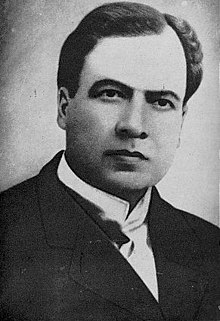Rubén Darío
Appearance

Félix Rubén García Sarmiento (January 18, 1867 – February 6, 1916) was a Nicaraguan poet who wrote under the pseudonym of Rubén Darío.
Quotes
[edit]- I seek a form that my style cannot discover,
a bud of thought that wants to be a rose.- Prosas Profanas y Otros Poemas (Profane Hymns and Other Poems). I Seek a Form (1896).
- Dichoso el árbol, que es apenas sensitivo,
y más la piedra dura porque esa ya no siente,
pues no hay dolor más grande que el dolor de ser vivo,
ni mayor pesadumbre que la vida consciente.- Blessed is the almost insensitive tree,
more blessed is the hard stone that doesn't feel,
for no pain is greater than the pain of being alive,
and no sorrow more intense than conscious life. - Cantos de vida y esperanza (1901), "Lo fatal" ("Fatalism")
- Quoted in Chambers Dictionary of Quotations (1997), p. 305.
- Blessed is the almost insensitive tree,
- The America of Moctezuma and Atahualpa,
the aromatic America of Columbus,
Catholic America, Spanish America,
the America where noble Cuauhtémoc said:
"I am not on a bed of roses" —our America,
trembling with hurricanes, trembling with Love:
O men with Saxon eyes and barbarous souls,
our America lives. And dreams. And loves.
And it is the daughter of the Sun. Be careful.- Cantos de Vida y Esperanza (Songs of Life and Hope). A Roosevelt (To Roosevelt) (1905).
Los Cisnes y Otros Poemas (The Swans and Other Poems) (1905)
[edit]- The tree is happy because it is scarcely sentient;
the hard rock is happier still, it feels nothing:
there is no pain as great as being alive,
no burden heavier than that of conscious life.- Fatalidad (Fatality).
- Pity for him who one day looks upon
his inward sphinx and questions it. He is lost.- Pity for Him Who One Day.
Quotes about Rubén Darío
[edit]- From before I knew how to read, my parents had me memorize poems by Ruben Dario, the great Nicaraguan poet who founded the modernist movement that transformed the Spanish language and whose work I recited with pleasure to whoever was naïve enough to ask me to do so. The rhythm of Dario’s poems fascinated me. Often—and even alone—I would recite his work out loud. Understanding the meaning of his verse didn’t matter, for the music of his poems was the most important thing. It was like the voice of the wind, the pounding of rain on windows, or the eternal roar of the ocean waves.
- Claribel Alegría speech (2006) Translation from the Spanish by David Draper Clark
- In Spanish, we have a tradition of open-ended, poetic stories. It's a very popular genre. Bequer, Lorca, Dario all wrote in this way. There are lots of writers who never wrote stories that had the knot-and-ending style. And they are considered great writers; they give a lot of pleasure.
- Rosario Ferré interview in Backtalk: Women Writers Speak Out by Donna Marie Perry (1993)
- In Nicaraguan history, the great modernist poet Rubén Darío is a strong figure, not just for literary people but for workers and farmers who possess a relatively low educational level. Attempting to trace the importance of poetry in the lives of Nicaraguans, one logically goes back to Darío...Most of those interviewed here speak of their links to Darío. His work is at the very roots of poetic experience in the country in much the same way that Whitman's Leaves of Grass shaped poetry in the United States.
- Margaret Randall Introduction in Risking a Somersault in the Air: Conversations with Nicaraguan Writers
- Rubén Darío, our national poet and cultural hero
- Daisy Zamora Interview (2023)

